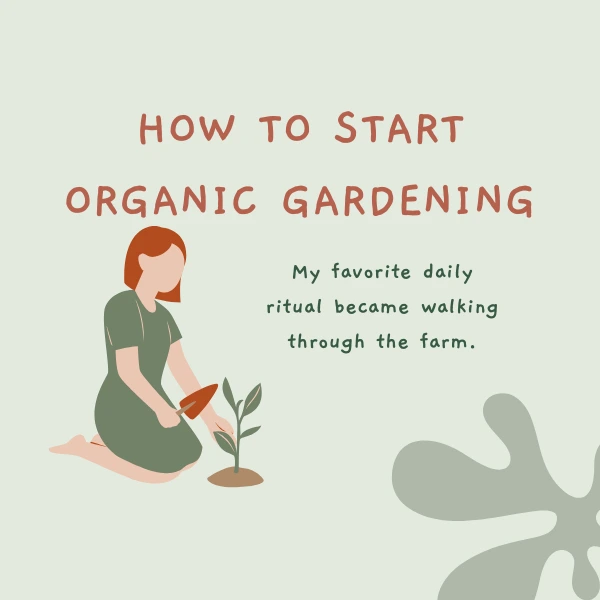
How to Start Organic Gardening: A Beginner’s Step-by-Step Guide
Organic gardening is more than just growing fruits and vegetables — it’s about cultivating a healthy, sustainable environment where plants, soil, and people thrive together. Whether you’re looking to grow your own food, reduce chemicals in your home, or just enjoy the therapeutic benefits of gardening, starting your own organic garden is a rewarding journey.
In this guide, we’ll walk you through the basics to help you grow your first organic garden — no matter the size of your space or your level of experience.
Step 1: Choose the Right Location
The foundation of a healthy garden begins with location. Most vegetables and herbs need at least 6 hours of sunlight daily. Choose a spot that gets plenty of light, is easily accessible, and has good drainage.
Tip: If you’re tight on space, consider container gardening or vertical gardening on balconies or patios.
Step 2: Build Healthy Soil
Healthy soil = healthy plants. Organic gardening focuses on enriching the soil with natural compost, manure, and mulch instead of synthetic fertilisers.
- Test your soil to understand pH and nutrient levels.
- Add compost or aged manure to boost organic matter.
- Avoid chemical treatments — they kill beneficial microbes.
Pro Tip: Start composting kitchen scraps like veggie peels, eggshells, and coffee grounds.
Step 3: Choose Organic Seeds or Seedlings
Opt for certified organic seeds or plants that haven’t been treated with pesticides or synthetic chemicals. Look for varieties that are resistant to local pests and diseases.
Where to buy: Reputable nurseries, organic gardening stores, or online suppliers.
Step 4: Practice Companion Planting
Companion planting is the organic way to protect your crops. Some plants naturally repel pests or enhance the growth of others.
Examples:
- Tomatoes & basil – Basil repels tomato hornworms.
- Carrots & onions – Onions deter carrot flies.
- Marigolds – Natural pest repellents for many garden insects.
Step 5: Water Wisely
Overwatering can cause root rot, while underwatering can stunt growth. Use soaker hoses or drip irrigation to water deeply and directly at the root zone.
Water early in the morning to reduce evaporation and prevent fungal diseases.
Step 6: Use Natural Pest Control
Avoid chemical pesticides by using eco-friendly alternatives like:
- Neem oil spray
- Garlic or chili sprays
- Beneficial insects like ladybugs or lacewings
- Physical barriers (e.g., row covers, nets)
Step 7: Mulch and Weed Regularly
Applying mulch (like straw, bark, or compost) helps:
- Retain moisture
- Prevent weeds
- Enrich the soil as it breaks down
Weed often and manually to avoid harming the surrounding plants.
Step 8: Harvest and Rotate Crops
Once your garden starts producing, harvest regularly to encourage more growth. At the end of each season, practice crop rotation to prevent soil depletion and reduce disease risk.
Benefits of Organic Gardening
✅ Healthier, chemical-free food
✅ Lower environmental impact
✅ Builds soil fertility over time
✅ Encourages pollinators and biodiversity
✅ Therapeutic and rewarding hobby
Final Thoughts
Starting an organic garden might take a little extra care in the beginning, but the long-term benefits for your health, the environment, and your taste buds are worth it. Even a few pots on your balcony can make a big difference.
So grab your gloves, dig in, and let your organic garden grow!
Want to learn more in-depth organic gardening secrets that go beyond this blog post? 🌱
If you’re serious about growing healthy, chemical-free plants and turning your garden into a sustainable haven, don’t miss my complete guide — Organic Gardening Tips eBook.
Inside, you’ll discover exclusive insights not covered in this article — from free organic mulching methods and green watering techniques to container gardening strategies and eco-friendly soil care.
👉 Download your copy today and get all the practical knowledge you need to start and grow a truly organic garden—naturally and successfully. 🌿
👉 Want to learn more organic gardening tips and expert advice?
Check out organic gardening for in-depth guides, seasonal planting tips, and beginner-friendly resources.
FAQs
1. Can I start an organic garden without a backyard?
Yes! Use containers, grow bags, or vertical garden systems on patios or balconies.
2. How do I know if a product is safe for organic gardening?
Look for products labeled “OMRI Listed” (Organic Materials Review Institute) or certified organic.
3. What are the easiest plants to start with?
Lettuce, radishes, cherry tomatoes, and herbs like basil, mint, and parsley are perfect for beginners.
4. Do I need to use compost?
Yes, compost improves soil structure, adds nutrients, and supports beneficial microbes — it’s essential for organic gardening.
5. How do I keep pests away without chemicals?
Use companion planting, neem oil, garlic spray, and introduce helpful insects like ladybugs to manage pests naturally.
